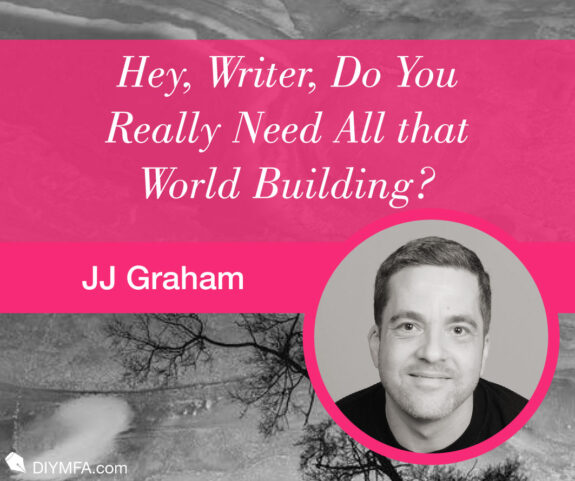There is nothing more fun than building a world from scratch. Entire magic systems, new technology, alternate timelines, fascinating characters… And you, and only you, make the rules for your world: what creatures exist there? How does physics work (or not work)? Where in time does your world take place?
We introverts are stuck in our heads so often I’d say we excel at world building. While waiting for the bus to arrive or waiting for the line to move at the grocery store checkout, we tend to ruminate or toss an idea around in our head, birthing small sparks in our imaginations that later take flight into sweeping universes. A late night might see us sketching out a map of this new universe and detailing a crazy complicated (but fun!) magic system.
But should we put every detail about that world on the page? Absolutely not.
Hear Me Out
I came close to including way too much world building in a draft of the novel I have out on submission, but thankfully, the writing community I belonged to at the time (in the form of small group coaching) gave me a resounding, “Get out of the weeds!” during a critique session.
I’d spent days writing a whole history of how Victorian Spiritualists in the early 1900s formed a group of psychics the government later recruited to help the Allies in World War II. And that this group of ragtag psychics had gotten their butts kicked by a demon during their first mission only to rally later and send said demon back to the shadowy realm where it belonged. Super interesting, right? I thought so. Well, guess how much of that history made it into the final draft of the book? One sentence. One.
That’s Not a Typo
During that critique, the small group writers agreed I had committed a mortal sin: the info dump. Looking back, oof, they were right, but it was painful to hear at the time. After all, I’d spent so much time coming up with the ins and outs of the world and the intricate history behind it. But at the end of the day, I had to ask myself the question, “Would I, as a reader, be that interested in the nitty gritty of the world?”
The answer was no, I wouldn’t be. I’d want the author to get on with the story already, not give me every small detail which wouldn’t even be important later.
But World Building is Still Important
Don’t think I’m discounting world building. I’m not. Not in the slightest. It’s still vital that the story be rooted on a firm foundation, not on shifting sands that would confuse your reader. Magic systems by their nature should have explicit rules. Technology should have clear limitations. There should be a rich backstory for the world you’ve built. You shouldn’t reveal everything to the reader, though.
By all means, write out the history, the rules, everything. But know that what you create is for you more than it is for your readers. You need this information to direct the course of your writing, and it will ultimately form the spine of your story, even if it’s not explicitly written on the page. Also, you may serialize that story, and you’ll need those guidelines especially then.
Essentially, what I’m saying is that the nitty-gritty of all the details isn’t important to readers, but how you reveal that information is important. In my case, I’d info-dumped paragraphs of history at once, leaving the group members to wonder why they needed to know that information and why they needed to know it right at that moment.
What’s more effective is giving readers a small bit of information about your world at a time as they need it. Maybe it’s through the eyes of your protagonist during seemingly mundane moments, so your reader becomes even more immersed in the character. Or maybe it comes up in dialogue, giving you a juicy way to add tension to a scene. Between revealing these gold nuggets, you’ll create a knowledge gap for the reader, making them wonder. This is a surefire way to keep readers engaged.
Here’s How to Do It Well
In the bestselling book Wool, author Hugh Howey gives us a post-apocalyptic world where only 10,000 people remain, all living in an underground silo. Nobody knows what happened to the Earth hundreds of years before, nobody knows who built the silo other than they’re named the Founders, and nobody knows just how toxic the outside world is other than a television screen on the top floor showing a wasteland above the silo.
Sounds interesting, right? Here’s a fantastic way the author shows readers how the silo works, and how it looks, feels, and smells: instead of info-dumping, we follow the silo’s mayor on a journey from the top level to the very bottom on her way to convince a woman to be the next sheriff. We see through the mayor’s eyes what their world looks like and how it works. We get her reactions to events she experiences and conversations she has, giving us more insight into her character. Super effective and way more interesting than a page of dry explanation.
What’s more, not once in the book does Howey mention the silo’s history nor who the mysterious Founders were. He keeps readers, well… reading. In fact, it’s not until the second book in the series that Howey reveals how and why the silo was created.
The author was so good at giving just enough information to readers to keep them reading that Wool made the USA Today and New York Times bestseller lists, and Apple TV+ just aired the season finale of the television adaptation Silo, based on the book.
A Word of Warning
Here’s a caveat to everything I laid out for you: none of this applies to your first draft. That draft is strictly for you, and you’ll make so many pass-throughs while editing, you can easily cross out paragraphs of backstory and world building to reduce them to a sentence or a clue you drop to the reader. Overthinking the drafting stage of a story can (and will) result in feeling blocked.
What stories have you read that contain intricate world building that’s revealed in an effective way? Sound off in the comments!

JJ Graham writes spooky romance. Strong character representation of everyone, including queer and neurodivergent characters are important to him because everybody deserves to see themselves in romance stories.
You can find him on his website and follow him on Facebook, Twitter, and TikTok.







